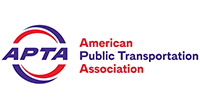Tonight (September 28), Democratic Leaders of the U.S. House of Representatives unveiled a new, approximately $2.2 trillion COVID-19 bill. The bill, entitled “The Heroes Act”, includes $32 billion of COVID-19 emergency transit funding and, more than double the transit funding provided in the May version of the bill. The Heroes Act also provides $2.4 billion for Amtrak grants.
APTA President and CEO Paul Skoutelas issued a statement lauding The Heroes Act for providing $32 billion of COVID-19 emergency transit funding. Please click here to view the APTA Press Release.
The House of Representatives may consider the bill later this week. The bill also serves as a starting point for House Democrats’ position in further negotiations with the White House and Senate Leaders on new COVID-19 legislation.
CALL TO ACTION
We strongly encourage you to contact your Representatives today
and urge them to support The Heroes Act and the $32 billion
of emergency transit funding.
To contact your Representatives, please call 202.224.3121.
Please click here to view APTA’s Talking Points.
Public Transit
A primary objective of the emergency transit funding is to ensure that public transit agencies receive sufficient funding, when combined with their CARES Act apportionments, to equal 100 percent of public transit agencies’ operating expenses. To the maximum extent possible, the funds shall be directed to payroll and public transit operations, unless the recipient certifies that it has not furloughed any employees. The transit funds provided under The Heroes Act are available for operating expenses and the Federal share is 100 percent, at the option of the recipient.
The bill distributes the funds through multiple mechanisms:
- $18.5 billion is for § 5307 (and § 5337) grants to urbanized areas. However, the amounts made available by these grants, combined with CARES Act grants, may not exceed 100 percent of the recipients’ 2018 operating costs. Any remaining amounts will be distributed to agencies that did not hit the 100-percent operating cost threshold.
- $750 million is for § 5311 grants to rural areas.
- $250 million is for § 5310 grants for seniors and persons with disabilities.
- $2.5 billion is for § 5309 Capital Investment Grants (CIG) to assist project sponsors with their non-federal financial commitments. Under specific conditions, the bill provides project sponsors that have received or will receive fiscal year (FY) 2019 or FY 2020 CIG allocations with additional funding. It distributes the funds proportionally to qualified project sponsors and will not be counted toward the maximum federal financial assistance. Any remaining funds will be rolled into the § 5324 Emergency Relief program.
- $10 billion is for § 5324 Emergency Relief grants for public transit agencies that require additional assistance to maintain operations. The Secretary of Transportation is required to issue a Notice of Funding Opportunity not later than 120 days of the date of enactment and applications are due within 180 days of enactment. The Secretary shall give preference to agencies in urbanized areas that received less than 100 percent of their operating expenses from the funds made available under § 5307 as outlined above. Intercity bus providers, who have previously partnered with § 5311 recipients, are also eligible to apply for these funds.
Amtrak
The bill also includes $2.4 billion for Amtrak grants to prevent, prepare for, and respond to COVID-19, including:
• $1.4 billion for Northeast Corridor grants; and
• $1 billion for National Network grants.
It sets aside $219 million of these funds to be available to Amtrak in lieu of commuter rail route payments.
Non-Emergency Medical Transportation
Division K, Title I of The Heroes Act includes language that adds Non-Emergency Medical Transportation (NEMT) to the list of mandated Medicaid benefits by codifying current Medicaid NEMT regulations. In addition to mandating the NEMT benefit, the bill requires the Centers for Medicare & Medicaid Services (CMS) to convene a stakeholder working group to focus on Medicaid program integrity issues, and other challenges in providing NEMT services. In addition, the bill mandates that the Department of Health and Human Services assess the guidance that CMS provides to states on the federal requirements for NEMT and includes driver requirements for providing NEMT services. Last, the Government Accountability Office is required to conduct a nationwide study on NEMT coverage to identify safeguards to prevent fraud and abuse in the program.
Multi-State Entities
Finally, the bill provides $100 million for multi-state entities (e.g., Port Authority of New York and New Jersey) that are involved in the transportation of passengers or cargo and are suffering revenue losses due to the COVID-19 pandemic.
Please click here to view the bill. Please click here to view a section-by-section summary of the bill.




